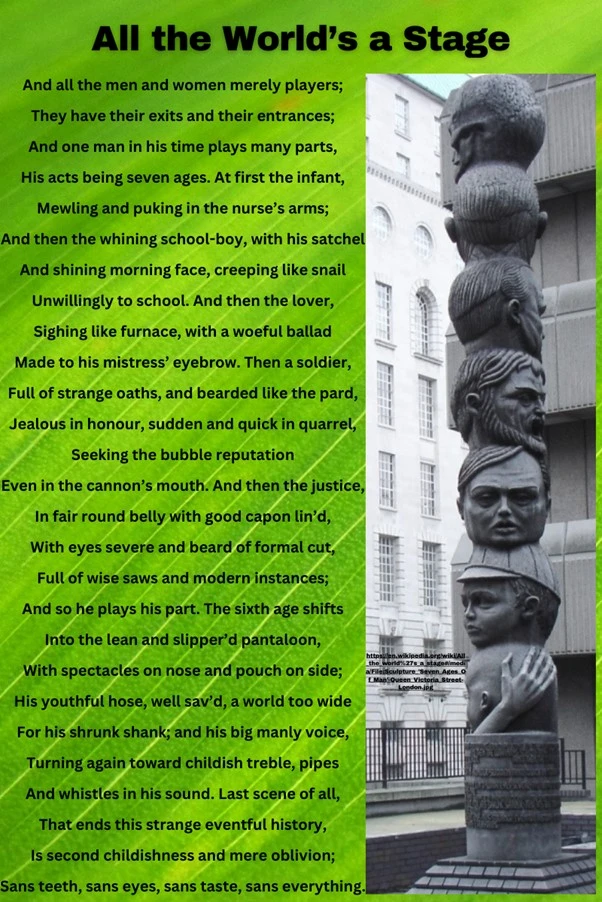Poem

About the Author
William Shakespeare, often regarded as the greatest playwright in the English language, was born in Stratford-upon-Avon, England, in April 1564. He began his career as an actor and playwright in London during the late 16th century, becoming a prominent member of the Lord Chamberlain’s Men, a leading theater company of the time. Shakespeare wrote approximately 39 plays and 154 sonnets, creating timeless works that span multiple genres including tragedy, comedy, and historical drama. His most famous plays, such as “Hamlet,” “Romeo and Juliet,” “Macbeth,” and “A Midsummer Night’s Dream,” have been translated into countless languages and continue to be performed worldwide. Despite limited biographical details, we know he married Anne Hathaway in 1582 and had three children. Shakespeare’s profound understanding of human nature, brilliant use of language, and ability to capture complex emotions revolutionized English literature. He died on April 23, 1616, in his hometown of Stratford-upon-Avon, leaving behind a literary legacy that has profoundly influenced global culture and writing for centuries.
Summary of the Poem
The poem is actually a monologue from Shakespeare’s play “As You Like It,” spoken by the character Jaques in Act II, Scene VII. It is commonly known as the “All the world’s a stage” speech, and it is one of the most famous passages in Shakespeare’s works.
In this profound soliloquy, Jaques describes human life as a theatrical performance, where people play different roles at various stages of life. He breaks down life into seven ages or stages:
1. Infant: A helpless, crying baby, dependent on others.
2. Schoolboy: Reluctant to go to school, with a shining morning face.
3. Lover: Sighing like a furnace, writing passionate poetry to his beloved.
4. Soldier: Full of ambitious and competitive spirit, seeking reputation and honor.
5. Justice/Middle-aged man: With a fair round belly, wise judgment, and a beard.
6. Old man: Slipping into weakness, with spectacles on his nose and shrunk shanks.
7. Second childhood: Approaching the end of life, losing everything – teeth, eyes, taste, and eventually life itself.
The monologue is a metaphorical exploration of human life’s transient nature, suggesting that we are all actors playing predetermined roles in the grand theater of existence. It highlights the predictability and universality of human experience, while also conveying a sense of melancholy about the inevitable progression of life.
The famous opening lines are: “All the world’s a stage, And all the men and women merely players; They have their exits and their entrances, And one man in his time plays many parts…”
Multiple Choice Questions
1. What, according to the poet, is the first stage of human life?
a) infancy
b) old age
c) being a student
d) death
2. The poet compares the world to a . . . . . . ?
a) battleground where armies are fighting
b) courtroom where a judge is pronouncing his/her decisions
c) stage where a drama is in progress
d) school where the student is leaning his/her lessons
3. Who is described as "Mewling and pucking in the nurse's arms??
a) soldier
b) schoolboy
c) judge
d) infant
4. Who is described as seeking bubble reputation?
a) infant
b) soldier
c) judge
d) pantoon
5. Who speaks the "All the world's a stage" monologue in the play?
a) Hamlet
b) Jaques
c) Rosalind
d) Orlando
6. In how many stages does Jaques divide human life?
a) 5 stages
b) 6 stages
c) 7 stages
d) 8 stages
7. What characterizes the first stage of life in the monologue?
a) Writing poetry
b) A helpless, crying baby
c) Seeking reputation
d) Having a fair round belly
8. What metaphor does Shakespeare use to describe human life?
a) A journey
b) A river
c) A book
d) A stage
9. In which play does this famous monologue appear?
a) Hamlet
b) Macbeth
c) As You Like It
d) Romeo and Juliet
10. How does the monologue describe the lover's stage?
a) With a fair round belly
b) Sighing like a furnace
c) Writing scholarly works
d) Losing teeth
11. What is the characteristic of the soldier stage in the monologue?
a) Weak and dependent
b) Seeking reputation and honor
c) Writing passionate poetry
d) Having spectacles
12. What does the monologue suggest about human life?
a) Life is completely unpredictable
b) Life is a predetermined theatrical performance
c) Life has no meaning
d) Life is always happy
13. How is the old man described in the final stages?
a) Strong and vibrant
b) Losing teeth, eyes, and taste
c) Full of energy
d) Writing poetry
14. What is the underlying tone of the monologue?
a) Purely comedic
b) Entirely optimistic
c) Melancholic and philosophical
d) Completely tragic
Answer the questions briefly (30-40 words)
- Why do men and women have exits and entrances in the play of life?
- Why should one men/women play many parts in the drama of life?
- Why does the schoolboy whine?
- What does the lover do?
- Mention one quality attributed to the middle-aged justice in this poem?
- What is the comparison between a person in his sixth stage and a child?
- What is the world that you will use to describe the attitude of the speaker Jacques in this poem?
References:
Board of editors. Literary Mindscapes I. Macmillan Publishers India Pvt. Ltd. Chennai, 2021.


Incredible points. Sound arguments. Keep up the amazing spirit.